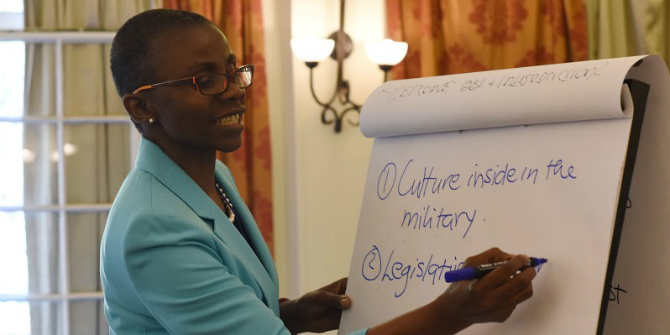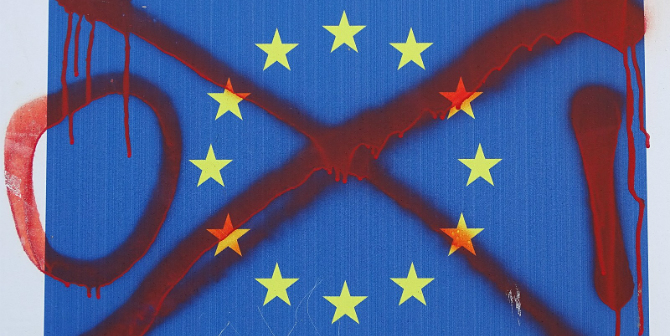Of course, most policies have some kind of gender dimension; well apart from Brexit or security or defence”. This is the sentiment that accompanies many of the public discussions of Brexit as a political process or as a juncture for European and British politics. Moreover, where the gender is discussed in relation to Brexit it is in relation to the impact on the UK, rather than the EU. Roberta Guerrina (University of Bristol), Katharine A. M. Wright (Newcastle University), and Toni Haastrup (University of Stirling) dispel such statements in their contribution to the Politics and Governance special issue that looks at the way Brexit will impact the ability of the EU to be a gender actor in external affairs.
After more than a decade of “crises” from financial to migration, there is ongoing questioning of the European integration project as failing to deliver for the people of Europe. Brexit is arguably an example of citizens “turning their back” on this project, portrayed by some as the epitome of a failing neoliberal model of globalisation. The rise of populist politics, and parties centred promoting ethno-national discourse has intensified the pressure on European institutions to connect with the citizens of Europe and make the project once again relevant to their everyday lives.
Given this backdrop and wider political context, it is interesting to explore the way EU external affairs, and specifically foreign and security policies, promote the idea of Europe and its norms. Given the high level of contention about the future trajectory of the internal project, it is unsurprising that European institutions would turn to the external domain to define and reassert the EU’s identity and values. The idea of that gender equality is a foundational norm of the process of European integration has gained significant political traction in European circles. European institutions, particularly the Commission, the Parliament and the External Action Service, have worked to mainstream gender across a range of areas/domains, expanding the reach of the principle well beyond its origins in employment policy.
A first observation is that since the 2016 referendum, the EU and the UK have diverged fairly significantly in the way they have included gender in their policy outlook. Whereas the EU has worked to develop frameworks for mainstreaming gender in external affairs through the review of the first two Gender Action Plans in 2019 and the development of a third, and Women, Peace and Security Strategy at the end of 2018, the UK has sought to reassert its credentials as a “masculinised” power in the international system encapsulated in the idea of “Global Britain”. This is the result of two overlapping processes. Whereas Brexit has taken up all the political oxygen in the UK, the EU has been engaged in the Brexit process through bilateral negotiations, as well as continuing to develop its own internal and external policies. The UK’s increasingly marginal position in decision-making process within the EU as a result of Brexit has facilitated the work undertaken in European institutions. Gender mainstreaming is increasingly being operationalised as the main strategic tool for embedding a deeper commitment to gender equality in the organisation. It is worth noting that this process has not been without significant setback. As a matter of fact, gender mainstreaming has been operationalised in a rather piecemeal and often superficial way in mainstream policy domains. The latest example of this continued marginalisation of gender concerns are the Brexit negotiations.

The adoption of a critical feminist approach provides useful insights into these processes. Specifically, it draws attention to the systemic silences. The way Brexit as a process has unfolded, i.e. in the form of negotiations that happen “behind closed doors”, helps to hide the gendered nature of the institutions currently shaping the process itself. Moreover the limited role of the FEMM Committee and civil society organisations also reduces opportunities for scrutiny and advocacy during key decision making processes. A feminist approach helps to understand how implicit bias will shape the outcomes.
Foreign Policy, understood as encompassing foreign affairs, development and security and defence policies, has become a site of contestation for global gender norms. States, and increasingly organisations like the EU, are responsible for the operationalisation of the Women, Peace and Security agenda as defined by UN Security Council Resolution 1325 and associated resolutions. It could be argued that the UK was at the forefront of states implementing these principles at the national level. For example, through the Preventing Sexual Violence in Conflict Initiative, under the leadership of former Foreign Secretary William Hague in 2014. The EU, in contrast, has been making inroads into this area but navigating the complex institutional structures in addition to Member States biases and interests poses particular challenges. In this light, the EU’s recently adopted WPS Strategy is a significant step up for the EU in its commitment to gender mainstreaming in the foreign policy field.
While documents and speeches related to Women, Peace and Security testify to an increased focus on these issues by both the UK and the EU, the real test of institutional commitment to a policy is its longevity once the critical actors engaged in its development have stepped down. In the case of the UK, PSVI remains an area of work for the Foreign Office, however, it is much less high profile than when Hague was Foreign Secretary. The situation for the EU is more fluid as the Women, Peace and Security Strategy was only signed off by the Council of the EU in December 2018. However, an initial analysis of the Strategy highlights a step-change in the way the EU is engaging with the WPS agenda.
So, what does this have to do with Brexit? Starting from the position that this is not a singular event, but a process, what we can already see is a shift in externally facing policies by both actors. As the EU seeks to reassert its identity as a global actor, it is likely to draw more on its role as a gender actor. It does so by using the tools at its disposal and the remit of the Treaties, i.e. through gender mainstreaming. The UK political environment, on the other hand, has become fixated on “high salience” issues, e.g. migration, trade, and the NHS presented as gender-neutral. if the EU is truly committed to gender mainstreaming in foreign and security policy, after 31 January, gender must be a core element of Brexit negotiations and the EU’s approach to the UK in its new role as a third country.
This post represents the views of the author and not those of the Brexit blog, nor LSE. Image by CJTF-HOA.





